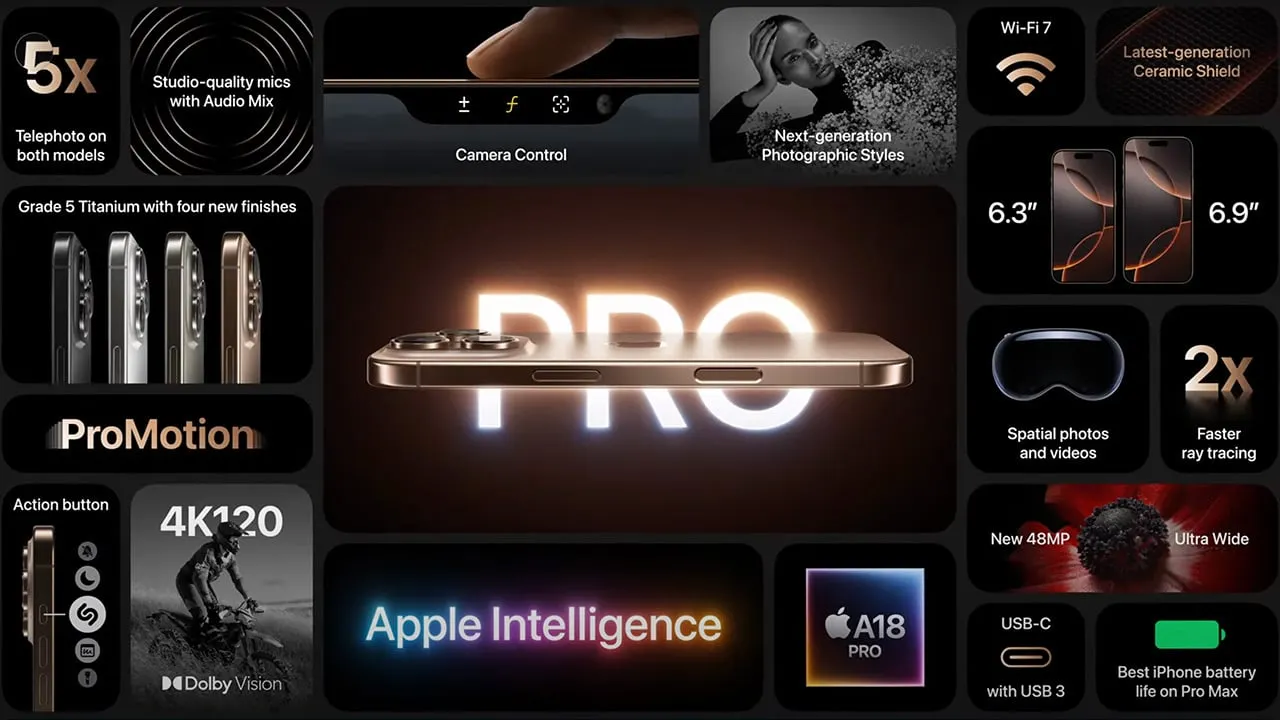At its highly anticipated event on Monday, Apple introduced the iPhone 16, the latest iteration of its popular mobile device the company called its most intelligent yet. Powered by Apple Intelligence and the new A18 chip, the iPhone 16 aims to revolutionize the user experience with advanced machine learning capabilities built directly into the device.
Beyond its intelligence, the iPhone 16 introduces a host of new features. Its customizable Action Button—formerly a feature only available on the iPhone 15 Pro—offers instant access to various functions such as recording voice memos or activating shortcuts. The new Camera Control feature, meanwhile, allows users to access the camera with just a click and adjust with a slide, offering faster access to visual intelligence functions like real-time object recognition.
The iPhone 16 and the iPhone 16 Pro have slightly larger screens than their predecessor and will add a new color: Desert Titanium. Preorders open on Friday, Sept. 13, and wide retail availability begins Sept. 20.
“The iPhone continues to make a profound impact on all of our lives; its power and capabilities enable us to do so much, so quickly and so easily,” said Apple CEO Tim Cook said, highlighting being able to connect with family and staying productive on the go.
“Apple Intelligence will supercharge these experiences and so many more,” Cook said. “It puts powerful generative models right at the core of your iPhone, making it even more powerful and delightful.”
In June, Apple had announced its leap into the red-hot artificial intelligence field with the launch of Apple Intelligence. The company claims artificial intelligence will fundamentally transform how we interact with our smartphones.
AirPods
During the presentation, Apple unveiled the latest generation of Apple AirPods line, starting with its entry-level AirPods 4. In addition to an improved in-ear design, Apple is adding an upgraded edition with noise canceling. The upgrade for the AirPods Pro 2 is that it can serve as a “clinical grade” hearing aid, and the AirPods Max finally adopt USB-C.
Apple Watch 10
Apple Watch Series 10 brings the largest, most advanced display yet, with a thinner design—10 percent thinner and lighter than the Series 9, and able to show more text on screen than previous models. The upgrade features enhanced capabilities, including faster charging, water depth and temperature gauge, and a new sleep apnea detection feature. The Apple Watch 10 can remind users to take medications, alert them to loud environments, and detect signs of atrial fibrillation as well as sleep apnea and breathing disturbances during sleep.
The Apple Watch Ultra 2 remains unchanged, save for a new black titanium color.
Generative AI on center stage
Using Apple Intelligence, the iPhone 16 can now understand language, process images, and automate tasks while maintaining user privacy using Apple’s Private Cloud Compute.
“Apple Intelligence is the personal intelligence system at the heart of the iPhone 16 line-up,” Apple senior vice president (SVP) of software engineering Craig Federighi said.
This generative AI functionality is further enhanced by an AI-powered overhaul of Siri, Apple's virtual assistant. Rather than feeling like a stand-alone program, Siri is now featured throughout the iPhone 16 experience.
“This is only possible thanks to our unique integration of hardware and software,” Federighi continued. “Apple Intelligence draws on the immense power of our silicon [chips] to run multiple generative models on the iPhone in your pocket.”
Generative AI features coming to the new iPhone 16 include language generation, image processing, and task automation to enhance productivity and creativity. iPhone users can also create custom emoji and will be able to search for photos and videos using prompts.
The A18 chip
Underpinning Apple’s dedication to developing artificial intelligence hardware and software, the company announced the new A18 Bionic chip for the iPhone 16 that Apple claims is the most advanced mobile processor ever created.
“Running powerful experiences like Apple intelligence on a device needs a chip with substantial high performance compute,” Apple's Vice President of the Silicon Engineering Group at Apple Sribalan Santhanam said. “It needs memory to store large models and bandwidth to access them quickly, and, of course, phenomenal energy efficiency.”
“We're bringing our latest breakthroughs and jumping two generations ahead from A16 bionic in iPhone 15 to A18, our brand new chip created specifically for iPhone 16,” he said.
Prioritizing privacy
Apple's new iPhone 16 integrates Apple Intelligence with Private Cloud Compute, allowing users to run several generative models while keeping user data secure.
“[Private Cloud Compute] runs on servers we built, especially with Apple silicon,” Federighi said. “Protecting your personal information when accessing server based intelligence requires a fundamental breakthrough in how these systems are built, and private cloud compute delivers just that.”
User data Federighi claimed is never stored or shared with Apple and is only used to fulfill your requests, with third-party independent experts continuously verifying this promise.
“This is an extraordinary step forward for privacy and AI—Apple intelligence is integrated throughout the system, across so many of the apps you use day to day,” Federighi said.

